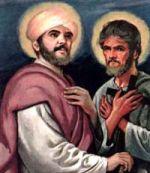Catechism of the Catholic Church
Share this paragraph of the Catechism:
Paragraph:
1128 This is the meaning of the Church's affirmation 49 that the sacraments act ex opere operato (literally: "by the very fact of the action's being performed"), i.e., by virtue of the saving work of Christ, accomplished once for all. It follows that "the sacrament is not wrought by the righteousness of either the celebrant or the recipient, but by the power of God." 50 From the moment that a sacrament is celebrated in accordance with the intention of the Church, the power of Christ and his Spirit acts in and through it, independently of the personal holiness of the minister. Nevertheless, the fruits of the sacraments also depend on the disposition of the one who receives them.
Move forward or back a paragraph: Previous | Next
Where this paragraph appears in the Catechism:
TABLE OF CONTENTS
» |
PART TWO: THE CELEBRATION OF THE CHRISTIAN MYSTERY |
» |
SECTION ONE: THE SACRAMENTAL ECONOMY |
» |
CHAPTER ONE: THE PASCHAL MYSTERY IN THE AGE OF THE CHURCH |
» |
ARTICLE 2: THE PASCHAL MYSTERY IN THE CHURCH'S SACRAMENTS |
Notes for the above paragraph:
49 Cf. Council of Trent (1547): DS 1608.50 St. Thomas Aquinas, STh III, 68, 8.
English Translation of the Cathechism of the Catholic Church for the United States of America © 1997, United States Catholic Conference, Inc.






